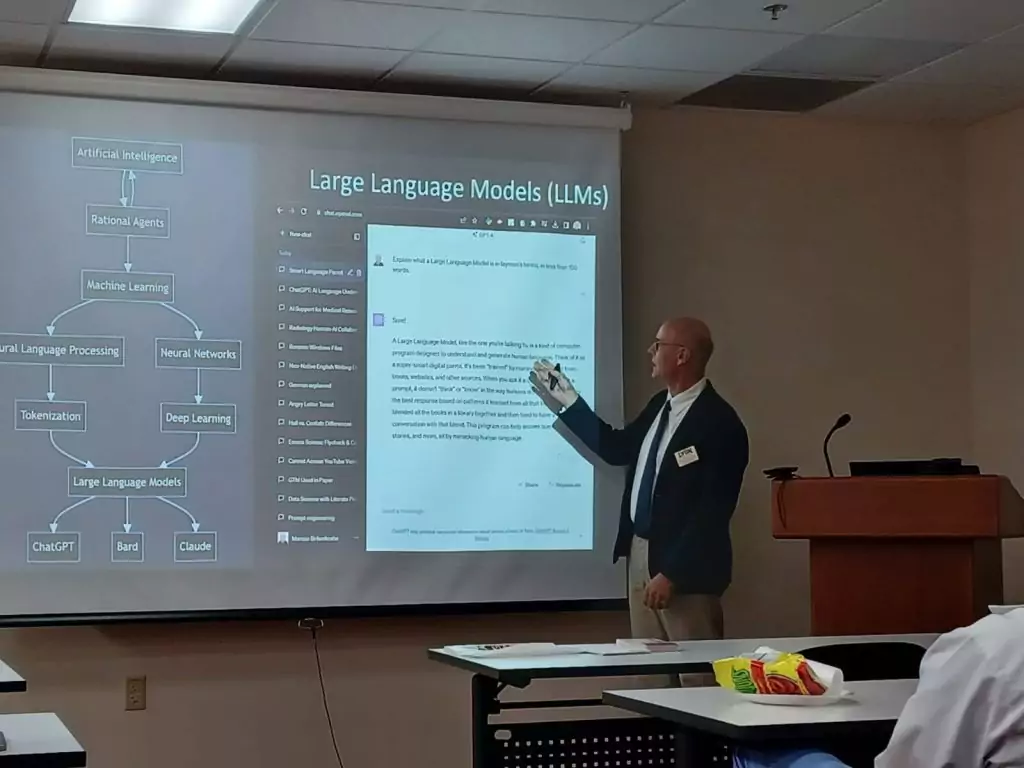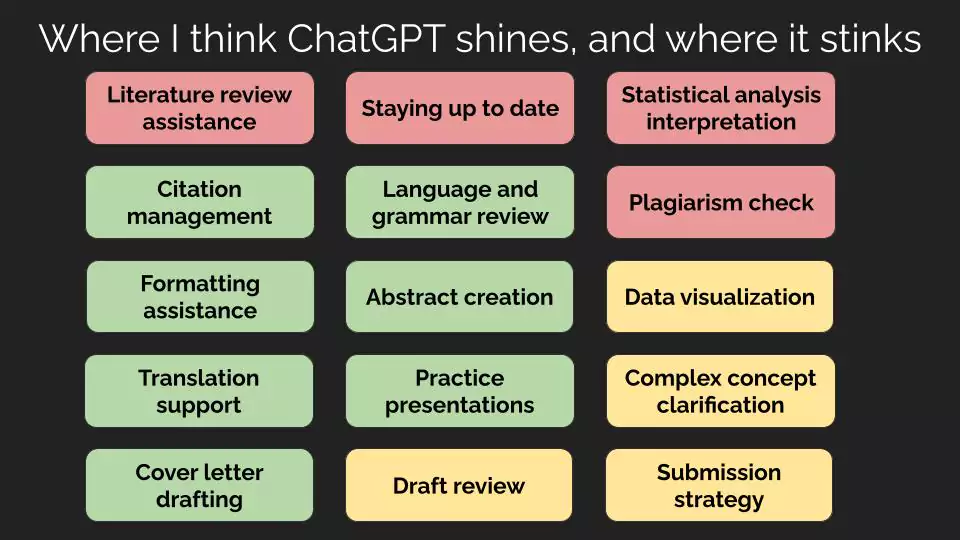Dr. Marcus Birkenkrahe, Lyon College’s Associate Professor of Computer and Data Science, discussed the potential use cases of ChatGPT for research purposes highlighting advantages and disadvantages of AI for academic writing and publishing.

✅ AI Essay Writer ✅ AI Detector ✅ Plagchecker ✅ Paraphraser
✅ Summarizer ✅ Citation Generator
On August 8 Dr. Marcus Birkenkrahe delivered a presentation at White River Health in Batesville and talked about the transformative potential of artificial intelligence in the realm of medical research. The focus of the talk was centered on the utilization of conversational AI, such as ChatGPT, to bolster research efforts and provide valuable support to medical residents.
There is a lot of talk about, but still little understanding of how AI-driven chatbots like ChatGPT can enhance research efforts. Dr. Marcus Birkenkrahe shared his experience of experimenting with different language models.

“The list of real and potential applications is very long: AI is transforming medical diagnosis, predictive analytics for patient care, drug discovery and design, and medical image interpretation,” said Dr. Birkenkrahe.
“However, there is a marked disconnect between the development and deployment of AI tools. This is understandable since medicine deals with questions of life and death.”
AI tools, Dr. Birkenkrahe noted, can aid in literature reviews, assist in drafting manuscripts, and boost overall research output. Dr. Birkenkrahe particularly emphasized their efficiency in citation management, grammar corrections, and rapid information summarization.
Dr. Birkenkrahe outlined areas in which ChatGPT could provide valuable assistance for research publishing and also commented on those activities with which it could be difficult to rely on in AI.

Green – good idea to use:
- Citation management. Guidance on the proper format for citations and references based on the desired citation style (e.g., APA, MLA, AMA).
- Language and grammar review. Ensuring the manuscript uses proper grammar, spelling, and scientific terminology.
- Formatting assistance. Providing guidance on formatting manuscripts according to specific journal guidelines.
- Translation support. Providing translations for abstracts or entire articles to reach broader audiences.
- Cover letter drafting. Assisting in drafting cover letters for manuscript submissions to journals.
- Language and grammar review. Ensuring the manuscript uses proper grammar, spelling, and scientific terminology.
- Abstract creation. Aiding in condensing findings into a succinct and coherent abstract.
- Practice presentations. For residents who need to orally present findings, I can provide Q&A sessions to prepare.
Yellow and Red – consider with caution or beware:
- Literature review assistance and Staying up to date – “The free version of ChatGPT (without extra support by scholarly plugins) could not provide up-to-date data and the model makes up references even when told explicitly not do to it. This gets frustrating fast! Nobody likes to be lied to!”
- Data visualization and Statistical analysis interpretation “It is a creative activity whenever it is really required – but the model is quite literally a “regression to the mean” of all available visualizations and interpretations.”
- Draft review and Submission strategy. “These aren’t creative but they’re also not completely cookie-cutter. When I used the bot to review a draft, I never learnt anything new that was really interesting or eye-opening (I usually knew what the problem was and that it wasn’t easy to fix). And submission strategy has a standard part (which is covered by reading the instructions), and a human part, which is about networking and correspondence. This last part involves a lot of subtle decisions. The AI can help you to write bland, correct letters when needed but it cannot really help you deal with a hostile reviewer.”
- Clarify complex concepts.
“The AI does that but on the level of an encyclopedia. If you’re actually an expert (and you should be, to an extent, before writing a paper on your very own research), then Wikipedia cannot help you.” - Plagiarism check.
“It sounds like an easy automation task but because fraud in science is rampant, authors do not need more tools to obscure the true origin of their ideas or their writing. Rephrasing should be done most consciously and deliberately, and not be left to AI.”
Dr. Birkenkrahe highlighted the changing dynamics of resident physicians’ roles in this age of data-centric medicine. He emphasized the significance of fine-tuning and selecting specific libraries for learning models, ensuring more precise and dependable AI implementations.
“I think the future of all serious applications lies in restricting yourself to specialized knowledge repositories that, though potentially very large, can be curated and controlled. This will give rise to chatbots that aren’t good at everything but are way more reliable at some things,” said Dr. Birkenkrahe.
Furthermore, he recognized the existing ethical dilemmas tied to employing AI in research, especially when utilizing models trained on publicly accessible data that hasn’t been verified.
“How useful these tools will turn out to be for researchers of any kind is also still a matter of debate: remember that we’ve only had access to them for less than one year!” stated Dr. Birkenkrahe. “This technology, from a user perspective, is highly untested, and it changes fairly dramatically all the time.”
Follow us on Reddit for more insights and updates.





Comments (0)
Welcome to A*Help comments!
We’re all about debate and discussion at A*Help.
We value the diverse opinions of users, so you may find points of view that you don’t agree with. And that’s cool. However, there are certain things we’re not OK with: attempts to manipulate our data in any way, for example, or the posting of discriminative, offensive, hateful, or disparaging material.